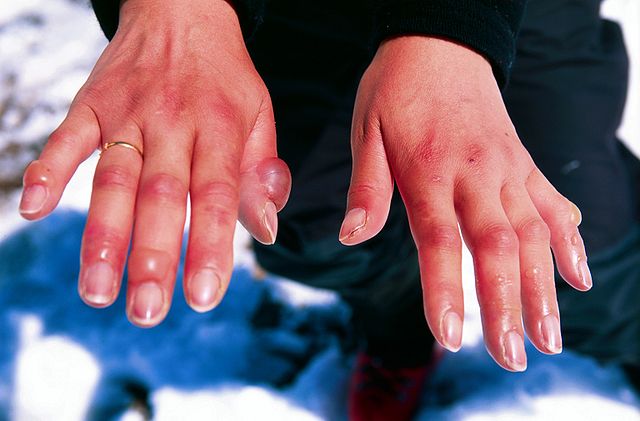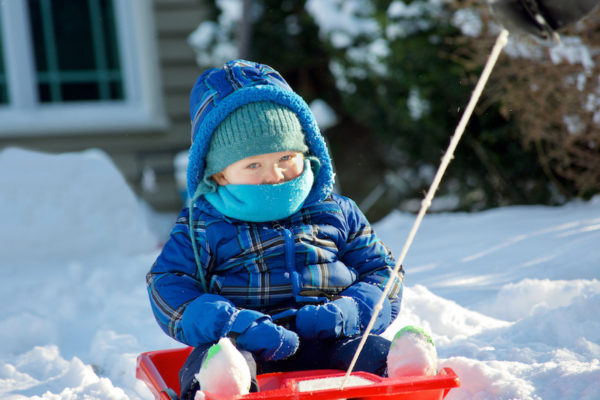
KRiemer / Pixabay
Bitterly cold — that’s what the weather report says — danger of frostbite.
Did you know that if you have frostbite, your skin freezes and ice crystals form inside your cells?
Did you also know that no matter what you might have seen in old movies, rubbing or massaging frostbitten skin only makes things worse?
Sign and symptoms of frostbite
- A slightly painful, prickly or itching sensation
- Red, white, pale or grayish-yellow skin
- Hard or waxy-looking skin
- A cold or burning feeling
- Numbness
- Clumsiness due to joint and muscle stiffness
- Blistering, in severe cases
Many of us who live in New England and love to be outdoors in the wintertime have probably experienced superficial frostbite or frostnip, as it’s sometimes called. Your skin feels like pins and needles and may be pale and numb. It happened to me the other day when I was clearing snow (several inches!) from my car.
If you ignore the pins and needles and stay out a little longer your skin will start to feel hard and frozen. If you get out of the cold at this point, when your skin thaws it will probably turn red and blister, but hopefully, you won’t have any lasting damage.
When frostbite goes deeper, your skin will become white, blue or blotchy and the tissue underneath will be hard and cold and have no feeling. If deeper tissue is frozen and blood vessels are affected, you may also have damage to your tendons, muscles, nerves, and bones. In the worst-case scenario, tissue dies (gangrene) and it might be necessary to amputate fingers, toes or a limb to prevent an infection.
All degrees of frostbite should be evaluated by a medical professional. When frostbite is deep, you need emergency care.
Frostbite typically affects smaller, more exposed areas of the body— your fingers, toes, nose, ears, cheeks and chin. Because your skin is likely to be numb, you may not realize you have frostbite until someone else points it out.

Photo courtesy winkyintheuk via Wikimedia Commons
Frostbite treatment dos and don’ts
- DO get to a warmer place
- DO replace wet clothing with soft dry clothing
- DO wrap in blankets to warm and protect frostbitten areas (separate affected fingers and toes with any kind of clean material)
- DO soak the affected area in warm, not hot, water for about 20 to 40 minutes
- DO wrap in gauze after re-warming, separating affected fingers and toes
- DO NOT use direct heat such as fire, heating pad or hair dryer to thaw – it can burn already damaged tissue
- DO NOT re-warm frostbitten tissue if it can’t be kept thawed – re-freezing can worsen tissue damage
- DO NOT rub or massage frostbitten skin – it can cause further damage
Dr. John Southall, a board-certified emergency medicine physician and editor and section chief for the prestigious journal the Annals of Emergency Medicine, says frostbite is one of his most “angst-provoking” diagnoses because, in general, it is avoidable.
He’s practiced in Colorado and Maine, so has seen his fair share of frostbite cases, and he doesn’t mince words when he describes his frustration. “We do not see a lot of frostbite in sober and competent adults,” says Dr. Southall. “We see it occasionally in outdoorsmen, who often accept this risk as part of their thrill-seeking, however, more often we see it in the intoxicated who misjudged their exposure. This is more of a social commentary than medical.”
Most tragically, adds Dr. Southall is that “we see it in those who cannot adequately speak for themselves: our young children and even our pets. Please remember when you are outdoors that your child’s young fingers, toes, and cheeks are more susceptible to environmental exposure than their larger adult counterparts.”
Below freezing temperatures are here, so it’s extremely important to heed Dr. Southall’s advice. Bundle up in layers, wear mittens, two pairs of socks and cover your head and ears and nose. Then you won’t have to worry about whether or not you should rub frostbitten skin – which, remember, you should not.


For this reason, and so many others, it’s a shame that the Teenage Rulebook currently prohibits the use of mittens. And pants. Congratulations, and keep it coming!
Great blog! Made me think also of chilblains, which is often associated with cold temperatures and warming your extremities too quickly. Sudden warming of your skin can cause painful inflammation associated with the inability of your capillaries to respond fast enough to accommodate the increase in blood flow to the area. Generally with chilblains you see swelling, blistering, red patches and it can be quite painful. One lesson we take from this is wear good gear when out in the cold (especially on days like today)! Your tips are wonderful, thank you Diane.
I needed a refresher as it’s 4 degrees here in Warren at the moment. Thanks for the info!
[…] chilblains was an old-fashioned term no longer in use, but in her comment on my recent post about frostbite, Diana Page told me a different story. “Made me think also of chilblains,” she wrote, “which […]
It is 30 to 40 degrees below freezing here with the wind factor, I live in Maine. It is very scary to know their may be homeless out and about in this weather. There are so many empty buildings here in Maine that they could put carts in to house the Homeless in Winter. But they won’t. I don’t understand how their life is less important then others just because they are homeless.
I live in the capital of Maine and it is currently the coldest town in Maine today. I personally have no vehicle, so walking is my only option. On days like today it forces me to stay indoors. My boyfriend is not so lucky as he has to walk to get to work. I worry about frostbite all the time and always try to dress warm to prevent it. It’s good to know what to do just in case though.
I think the best solution to not getting frost bite is to move to where its warm 🙂